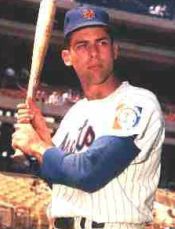Shale Briskin
MM Assistant Editor
With the 2013 MLB All-Star Game a week away, I will now be starting a short series that includes the performances of each Met in each All-Star Game since 1962. This year is the first since 1964 in which the Mets have hosted the game itself and David Wright and Matt Harvey will be the Mets' two representatives this year.
But who represented the Mets in other years? And how did their Midsummer Classic performances go? Let's find out! We begin with the 1960s.
1962: There was not much good at all about the Mets' inaugural season. The "Loveable Losers" set a new major league record with a 40-120 final record, that still stands today as the worst record of all time. Despite all this, there were a few notable bright spots. Frank Thomas hit 34 home runs and drove in 94 RBI, which were Mets' single season records for a while. And then there was Richie Ashburn.
A future member of the Baseball Hall of Fame, Ashburn spent the final season of his career with the Mets in 1962. He was arguably the Mets' best hitter that year with a .306 average, 7 home runs, 28 RBI and a .424 OBP. He was the Mets' lone All-Star as well. In 1962, there were two All-Star Games. Ashburn did not play in the first game, but got a single in his only at-bat in the second game.
1963: The Mets' second season featured the return of Brooklyn Dodgers legend, Duke Snider. In Snider's second to last season of his career, he batted .243 with 14 home runs and 45 RBI. Despite his skills declining by then, he was a great veteran presence on a Mets team that was searching for an identity. Snider was the Mets' only All-Star that year and struck out in his only at-bat in the game itself.
Second baseman Ron Hunt, the Mets' first ever starter in All-Star Game history.
1964: 1964 was a special year for the Mets. Not only did Shea Stadium open, but this was also the only season in which Shea Stadium ever hosted the Midsummer Classic in its 45-year history.
Unfortunately, the Mets only had one of its players in the game, and that was second baseman Ron Hunt. Hunt became the first Met in All-Star Game history to start in the game. He ended up going 1-for-3 at the plate that day with a single. For the year, Hunt finished with a .306 average, 6 home runs, 42 RBI and a .357 OBP.
1965: In 1965, the Mets once again had just one player in the All-Star Game. Longtime Met Ed Kranepool made his only All-Star Game appearance in his 18-year career. However, he did not play in the game itself. For the year, Kranepool batted .253 with 10 home runs and 53 RBI.
1966: In 1966, Ron Hunt would become the first Met to make multiple trips to the All-Star Game. However, he had just one at-bat this time around and did not reach base. Hunt batted .288 with 3 home runs and 33 RBI for the season.
1967: By 1967, the Mets were finally starting establish a direction of some sort. And that started with their new rookie ace, Tom Seaver. The eventual 1967 NL Rookie of the Year, Seaver pitched in the 15 inning of the Midsummer Classic and recorded the save by allowing just one walk to Carl Yasterzemski before finishing off the National League's 2-1 victory. Seaver's rookie season included a 16-13 record, a 2.76 ERA and 170 strikeouts. This would be first of many All-Star Game appearances for Seaver.
1968: For the first time, the Mets actually made more than one representative at the All-Star Game in 1968. Tom Seaver had another great season that year, with a 16-12 record, a 2.20 ERA and 205 strikeouts. He was also joined by rookie southpaw Jerry Koosman, who finished second in the 1968 NL Rookie of the Year voting. Koosman went 19-12 that year with a 2.08 ERA and 178 strikeouts. Also joining the two pitchers was catcher Jerry Grote. Grote was always more known for his defense, but contributed a .282 average, 3 home runs and 31 RBI at the plate as well.
In the 1968 Midsummer Classic, Seaver pitched both the seventh and eighth innings and struck out five batters, with two of them being Yastrzemski and Mickey Mantle. Koosman then came in to close the game in the ninth inning and got the final out, relieving Ron Reed of the Braves. Grote was hitless in his two at-bats.
1969: In 1969, the Mets shocked the world by winning 100 games and eventually the 1969 World Series. Joining Seaver and Koosman at the All-Star Game that year was left fielder Cleon Jones, who had a career season that year with a .340 average, 12 home runs, 75 RBI and a .422 OBP. Jones started in left field at what would turn out to be the only Midsummer Classic he was a part of. He went 2 for 4 at the plate with 2 runs scored.
In what was arguably the best season of his career, Seaver won his first of three NL Cy Young Awards. He went 25-7, with a 2.21 ERA and 208 strikeouts. Seaver though did not end up pitching in the All-Star Game that year.
Not to be outdone, Koosman held his own with a 17-9 record, a 2.28 ERA and 180 strikeouts that season. Koosman pitched in the seventh inning and part of the eighth inning of the 1969 All-Star Game. In 1.2 innings pitched, Koosman allowed just one hit.
Stay tuned for the next installment, in which we recap the Mets' All-Star Game performances of the 1970s.



No comments:
Post a Comment